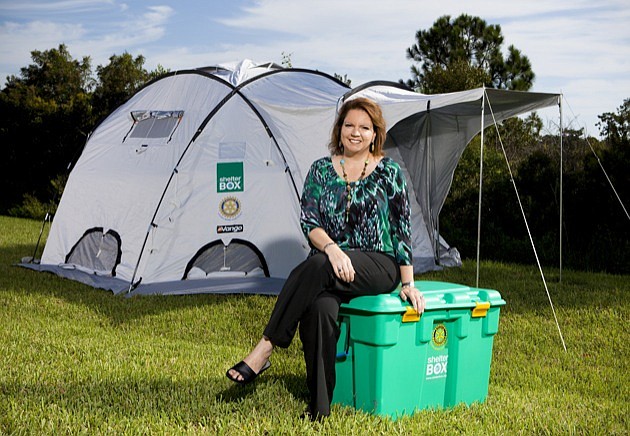- November 26, 2024
-
-
Loading

Loading


Turns out one the fastest growing organizations on the Gulf Coast is a nonprofit.
That's no easy feat, considering the carnage the recession has left on nonprofits and charities. But ShelterBox USA, a global disaster aid group, has defied the odds. Revenues for the fiscal year that ended in June surged more than 550% to $10 million. Its local employee count has also doubled over the last year, from three to six, with plans to hire at least four more people by 2012.
ShelterBox, run out of an office in a Lakewood Ranch corporate park, was founded by a Rotary Club in England in 2000. The Lakewood Ranch Rotary Club adopted the organization for a service project in 2002 and by 2004 it branched off into an independent nonprofit.
The organization has since responded to 100 disasters in more than 70 countries, including the June landslides in Pakistan and the earthquakes in Haiti in January.
The group's response consists of a military-like focus on delivering life-saving stuff to people in dire need. Using in-house trained volunteers, ShelterBox will deliver a box of supplies for 10 people, from a tent to a stove and a saw to children's crayons. A box costs $1,000 to assemble, ship and deliver to a country.
“We make sure it gets to the people who need it most,” says ShelterBox Executive Director Veronica Brandon Miller. “We are almost psychotic about it.”
Moreover, ShelterBox's recent success in fundraising and revenue growth holds lessons for both nonprofits and for-profit companies.
Indeed, the strategy Brandon Miller executed to solicit donations for ShelterBox turns the traditional method of nonprofit fundraising upside down. “A lot of nonprofits are still on the same mindset and going after the same donors as a few years ago,” says Miller. “We don't do traditional fundraising. We don't just start with a list and beg for dollars.”
ShelterBox instead capitalized on social media to generate interest and eventually donations. A blogger, for example, posted a story about the group that led to $130,000 in donations. And Facebook and Twitter feeds over the past few months have directly led to at least $50,000 in donations.
The “like this” page on Facebook and Twitter tweets of ShelterBox updates have been especially useful in getting the word out, ShelterBox officials say. So was a feature on CNN that tracked a ShelterBox box from the U.K. to Haiti.
Still, Brandon Miller says the real challenge, for any nonprofit or for-profit business, is to turn that appreciation into donations, or sales. ShelterBox does that by making sure donors are regularly updated on the status of their donation by tracking the whereabouts of their box on ShelterBox's Web site.
The transparency effort with donors has been vital for ShelterBox's other big outreach effort: To partner with global business brands to seek donations and continue to spread the ShelterBox word. McDonald's, Whole Foods Markets and Neiman Marcus are among the corporate brands the group has partnered with. Another partner, Lumber Liquidators, invited ShelterBox officials to ring the bell at the New York Stock Exchange with the company later this year.
ShelterBox's think-like-a-business mentality also carries over to its board, where Philadelphia-based entrepreneur Bill Decker was recently named chairman. Decker, who runs a corporate meetings and events firm, is also a ShelterBox volunteer and has traveled to Haiti and the Philippines to deliver boxes.
Decker's main goal with the group is to get it to the point where it has a stock of 500,000 boxes ready to be deployed anywhere in the world. The group has a current stock of about 300,000 boxes.
To be sure, it will take a lot more donations to reach that goal. But Decker says the organization's on-the-ground volunteers also play a key role in the mission to deliver aid better than anyone else. It's a stay-on-target principle Decker preaches in his day job.
“We want to focus on what we do really well,” says Decker. “We want to own it.”